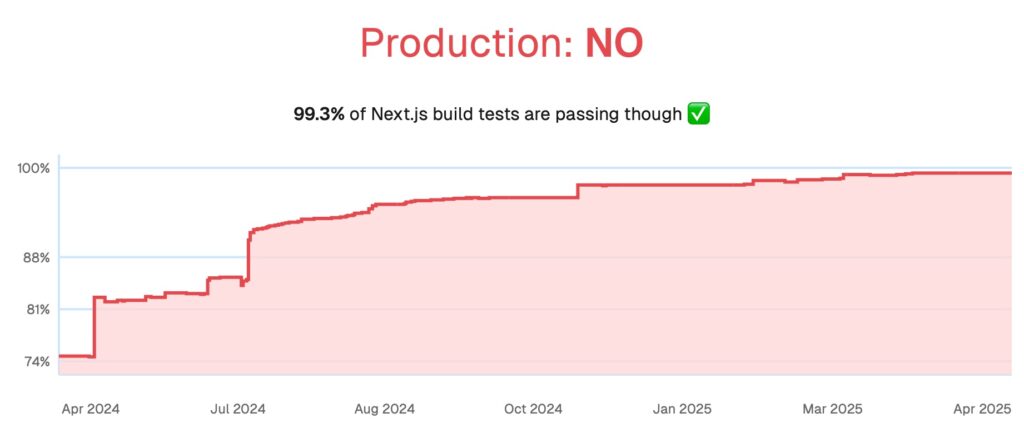
Next.js 15.3 is out with near-complete Turbopack support – but React Server Components (RSCs) are under fire in the community after a Shopify engineer declared that “5 years in, it isn’t working out.”
Turbopack is a Rust-based JavaScript bundler for TypeScript and React Server Components, created by Webpack inventor Tobias Koppers and much faster than its predecessor. Progress towards production-readiness since its introduction in October 2022 has been slow, but in the newly released Next.js 15.3 Turbopack passes more than 99 percent of tests, causing the Next.js team to suggest trying it for production builds. “If your application already works with Turbopack for dev, then it should work as-is,” the team suggested, though adding that it does not recommend Turbopack “in production for mission-critical applications” because of its alpha status.
Turbopack performance scales with more CPU cores, and according to Vercel is 28 percent faster than Webpack with 4 cores, but 83 percent faster with 30 cores.
There is also an option to use Rspack, also built with Rust, but with better Webpack compatibility. Vercel said that using the next-rspack adapter provided by the Rspack team passes 96 percent of tests, perhaps embarrassing for Vercel since Turbopack is its in-house project. According to the Rspack developers, “Turbopack started over with a redesigned architecture and configuration. This brings some benefits, but presents a steeper migration cost for projects that rely on webpack and its extensive ecosystem.”

Other new features in Next.js 15.3 include a client instrumentation hook for adding monitoring and analytics code, new navigation hooks for improved client-side routing, and an improved Next.js TypeScript language server plugin which is claimed to be about 60 percent faster.
Despite these incremental improvements, Next.js is still experiencing a backlash from developers concerned about bloat and excessive complexity. The Vercel-sponsored framework is declared to be “the most complete implementation” of Server Components and Suspense according to the official React documentation; but recently the entire concept of RSCs has come in for criticism.
Shopify engineer Michael Jackson, who works on the React-based Remix framework, said on X that “React Server Components are nice in theory, but 5 years in, it just isn’t working out.” Vue.js creator Evan You responded that “the bet” on React Server Components becoming the “idiomatic way to use React” has failed, thanks to the tradeoffs involved. “It leaks into, or even demands control over layers that are previously not in scope for client-side frameworks. This creates heavy complexity (and associate mental overhead) in order to get the main benefits it promises,” he said.
Fastify is a web framework focused on performance, and @fastify/react is a core renderer for React that aims to be a lightweight replacement for Next.js. Jonas Galvez, former member of the Nuxt core team and now lead maintainer for @fastify/vite, claimed that @fastify/react is 7 times faster than Next.js, measured by requests per second, and that @fastify/vue is over 14 times faster.
Allowance must be made for the fact that these comments come from people working on Next.js alternatives. Looking though at discussions like this one it does seem that frustration with over-complexity in Next.js is now not uncommon.
